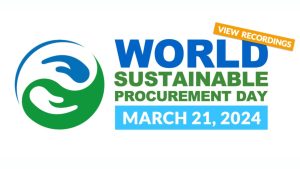Public procurement is promoted as “potentially one of the most important areas for environmental improvement,” a key point in SmartProcurementWorld’s Sustainability Africa 2021 Summit Report, and a sentiment supported by the International Institute for Sustainable Development
The Institute believes that “Public procurement is a powerful tool for driving markets towards more sustainable production patterns, and for creating markets for sustainable goods, services and infrastructure.”
When considering the enormous purchasing power of South Africa’s public procurement (accounting for around 20% of our gross domestic product and 30% of national, provincial and local budgets), there is considerable scope to leverage this function to address South Africa’s sustainability challenges.
South Africa is already leveraging public procurement to bring social change through preferential procurement procedures that promote supporting designated supplier groups.
Several South African provinces and metropoles have already defined sustainable public procurement commitments including the Western Cape, the City of Tshwane, Limpopo and Gauteng. Metropolitan municipalities have also joined forces with the South African Local Government Association (SALGA) and ICLEI Africa (Local Governments for Sustainability) – https://africa.iclei.org/ – to launch the Procura+ Africa Network to promote and implement SPP.
Benefits of sustainable procurement
In May 2022 SmartProcurementWorld held a summit on Sustainable Procurement where speakers discussed these very topics.
Four of the core benefits of sustainable procurement discussed during the SmartProcurementWorld Summit are highlighted below:
1. Risk management and building resilience within supply chains:
Sustainable procurement encourages the implementation of processes to proactively identify and address risks within supply chains. As an example – South African retailers such as The Foschini Group and Woolworths, have committed to increasing investment in local clothing manufacturers to hedge against their dependency on Chinese imports.
2. Reducing costs:
The World Economic Forum reports that sustainable purchasing strategies can reduce costs by up to 16%.16 This is achieved through:
- Improving resource efficiency: This includes the implementation of resource efficiency initiatives such as light-weighting of packaging materials, recycling, product backhauling and energy efficiency programmes.
- Improving process efficiency: This includes initiatives to implement more sustainable manufacturing (minimising waste and reducing environmental impact) and logistics (using alternative fuels, route optimisation, etc) practices.
3. Revenue growth:
Consumers are becoming increasingly socially and environmentally conscious, with an increase in the sale of sustainable products – even during the Covid-19 pandemic. A new global analysis conducted by the Economist Intelligence Unit across 54 nations found that the popularity of internet searches for sustainable goods around the world has increased by 71% in just five years, continuing to grow throughout the Covid-19 pandemic.
4. Enhanced corporate reputation:
The World Economic Forum has found sustainable supply chain practices can improve business brand value by 15-30%.
More details from the Sustainability Africa 2021 Summit Report can be accessed below:






































